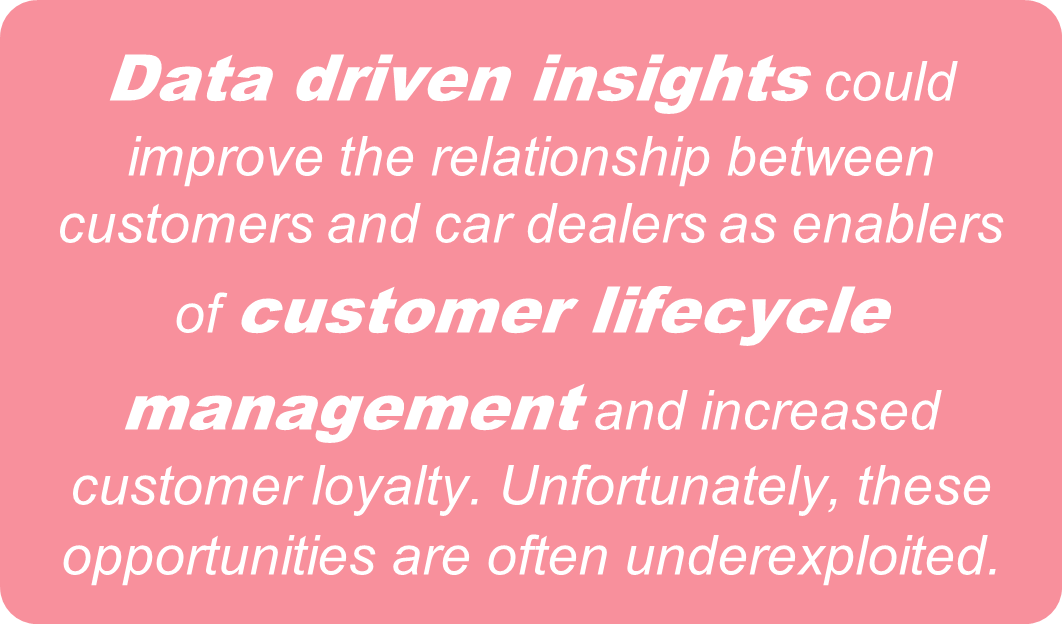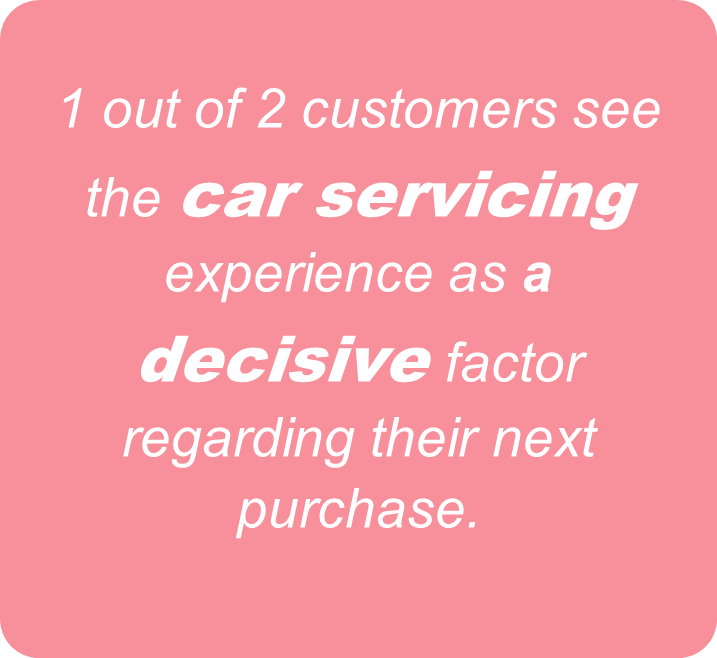Kōnosuke Matsushita, the founder of Panasonic, once said: “Aftersales service is more important than assistance before sales. It is through such service that one gets permanent customers.”. This statement reflects on the automotive industry, where our clients are completely rethinking their business models to cope with extensive challenges. Next to being recognized as one of the most profitable components of this industry, aftersales also provides for an ongoing relationship with the customer. Hence, no need to reiterate the importance of aftersales once again.
In addition to the challenges that are shaking the automotive industry as a whole, ngage identified four challenges that specifically reflect on aftersales. Are you curious about what we learned from experience with our clients? Don’t stop reading.
1. Consolidation of the market & complexity of aftersales
Belgium’s dealership landscape looks completely different than say, ten or even five years ago. The sector has known fast paced consolidation, and it is expected that it will continue in the next years. Telling examples are Van Mossel’s and Emil Frey’s ongoing acquisitions of smaller groups and independent dealership.
While enjoying
economies of scale, large groups distributing multiple brands also face
specific issues. They must juggle with different procedures, rules and
standards to obtain technical assistance or the submission and treatment of
warranty claims. Moreover, these procedures often must be handled through a
plethora of systems, impacting reporting as it becomes harder to consolidate
data and to compare apples with apples. On top of that, brand constraints add
an extra complexity layer as each brand expects their customers to experience
their journey in specific ways.
face
specific issues. They must juggle with different procedures, rules and
standards to obtain technical assistance or the submission and treatment of
warranty claims. Moreover, these procedures often must be handled through a
plethora of systems, impacting reporting as it becomes harder to consolidate
data and to compare apples with apples. On top of that, brand constraints add
an extra complexity layer as each brand expects their customers to experience
their journey in specific ways.
These side effects of market consolidation obstruct uniformity in a department where efficiency gains are crucial to profitability.
2. (Lack of) Digitalization and automation
While new distribution models find their way to the market thanks to the digitalization of the sales process, the aftersales modus operandi is also adapting through the adoption of enabling technologies.
Vehicles stacked with technology enable OEMs to activate remote access through connected features. This allows for over-the-air (OTA) software updates, meaning less time-consuming touchpoints with clients. In the meantime, this continuous data flow from connected cars permits more effective maintenance service due to more insights in customer driving habits.
 These data
driven insights could improve the relationship between customers and car
dealers as enablers of customer lifecycle management and increased customer
loyalty. Unfortunately, these opportunities are often underexploited as dealers
are often missing the necessary data that is owned by the OEM. Some
are also reluctant to engage more pro-actively with their clients.
These data
driven insights could improve the relationship between customers and car
dealers as enablers of customer lifecycle management and increased customer
loyalty. Unfortunately, these opportunities are often underexploited as dealers
are often missing the necessary data that is owned by the OEM. Some
are also reluctant to engage more pro-actively with their clients.
Technology can also improve conditions in workplaces. Think of “repair glasses” that were introduced to reduce repair times. While wearing these, mechanics are guided through a 3D animated view with step-by-step instructions on how to execute repair procedures efficiently and precisely. This comes in handy when vehicle technology is becoming more and more complex. Another example are the so-called co-bots, that support humans performing strenuous tasks by removing part of their load, with a positive impact on job sustainability and workplace safety.
Despite these examples, it is not always clear for car dealers which and how technology could improve their daily operations. One thing is sure though, with increasing pressure on margins in the sector, technology and digitalization will be part of the answer to improve operations in a sustainable way.
3. Electrification
The uprise of electrical vehicles (EVs) and related processes and technologies have a substantial impact on the whole automotive aftermarket.
- Service processes must be revised as most of the “regular” maintenance processes required for internal combustion engine (ICE) cars will become obsolete. Indeed, EVs do not need service and maintenance like ICE cars do as they contain far fewer moving parts or oil that needs to be changed. Dealerships struggling with the constantly evolving and uncertain context should make sure to future-proof their business by devising new profitable business models.
- Workshop areas must be adapted to be able to properly service the EVs, especially in terms of physical construction and new equipment. Renovations of workshops will among other things include charging facilities and safety equipment. However, cars will mainly remain hybrid and regular work including bodywork repairs and windscreen replacements will remain. Therefore, multifunctional workshops – adapted to both EV’s as ICE cars – must be designed.
- Aftersales staff must adopt new capabilities. Changing car technology and processes imply that skills will have to adapt too, and dealerships will no longer need large numbers of traditional mechanics. Moreover, vehicles are becoming much better at self-diagnosis, meaning that the capabilities to anticipate repairs will play an ever-bigger role in car maintenance. New competences in areas like vehicle connectivity and battery knowledge will become an essential skillset for anyone working in the car repair and maintenance industry in the future.
4. Customer Experience
1 out of 2 customers see the car servicing experience as a decisive factor regarding their next purchase. Despite this decisive impact of aftersales on customer loyalty, memorable – let alone positive – servicing experiences are rather the exception than the norm.
 One of the most
common service-related customer pain points is the tediousness of the entire
process. Numerous phone calls back-and-forth often precede the car drop-off,
and some might follow during the service. Besides the asynchrony between times
when customers and dealership staff can answer the phone, it is often unclear
to customers why some communications take place because of their redundancy or
the inability for the customer to answer the questions asked. To top it off, long
appointment delays and on-site waiting times during car drop-off, works or vehicle
restitution reinforce this feeling of tediousness.
One of the most
common service-related customer pain points is the tediousness of the entire
process. Numerous phone calls back-and-forth often precede the car drop-off,
and some might follow during the service. Besides the asynchrony between times
when customers and dealership staff can answer the phone, it is often unclear
to customers why some communications take place because of their redundancy or
the inability for the customer to answer the questions asked. To top it off, long
appointment delays and on-site waiting times during car drop-off, works or vehicle
restitution reinforce this feeling of tediousness.
Lack of transparency is also a recurring theme in customer satisfaction surveys. Since much of their daily organization depends on it, customers like to be aware of the works status on their car. This is a genuine issue for service advisors who often cannot reassure their customers as workshop planning depends on multiple factors they cannot control, and they often lack a real-time view on work progress. Besides planning issues, customers also dread receiving their bill at the end of the day since unexpected costs often arise during repairs. Customer feedbacks often refer to lack of communication, transparency, and preciseness regarding those costs.
Here too, digital solutions are seldom exploited by dealers while they allow for transparent, real-time, and traceable communication within the dealership (e.g., between the workshop and the reception) as well as with the customer. From our industry experience, the successful automakers of tomorrow will have a technology-infused strategy and a customer-centric culture
5. Conclusion
The automotive industry’s transformation promises considerable changes for all industry players. There is a huge learning curve ahead for all the different actors, who should take the opportunity to prepare at the early stages of the transformation and leverage upcoming opportunities. At ngage, we enable our clients to execute their strategies by upgrading their business models, improving business processes and designing exceptional customer journeys. Ngage is recognized by its clients as a trusted advisor that helps realize fit-for-purpose business transformation.
Would you like to discuss how we can turn your challenges into opportunities together? We’ll gladly pull up a chair to exchange ideas and enjoy a coffee with you.